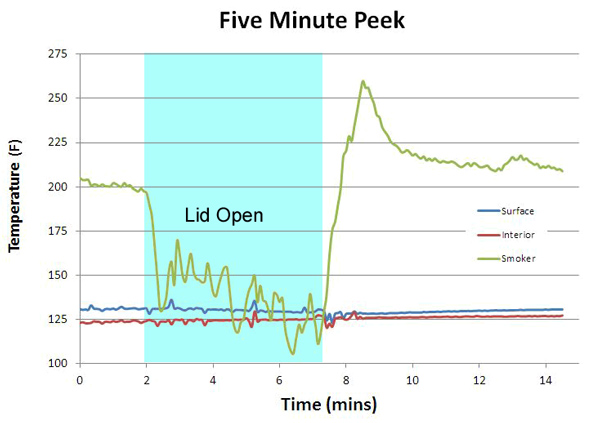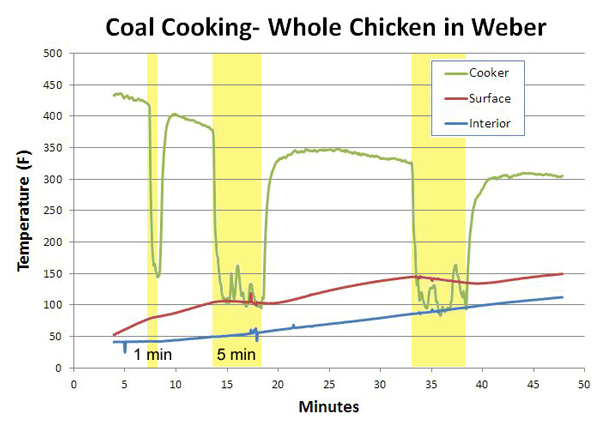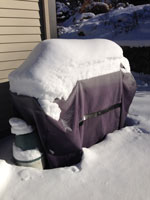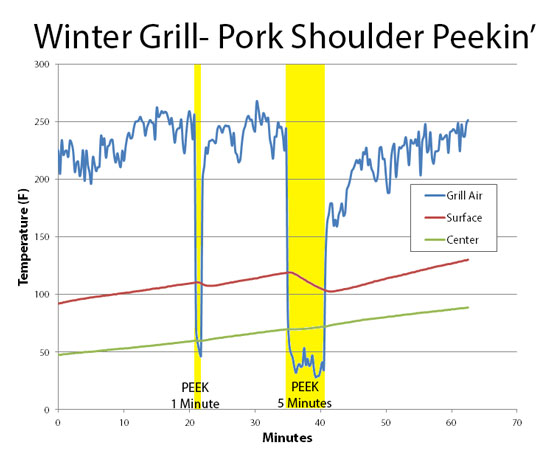| g e n u i n e i d e a s | ||||||
 |
 |
 |
 |
 |
 |
 |
| home | art and science |
writings | biography | food | inventions | search |
| peek a 'cue |
|
September 2011 At some point during a twelve hour, low and slow barbecue, its hard to resist the urge to "peek". Just once. Or to flip the ribs. Or to mop on some sauce. Opinions vary widely on peeking. Some claim a quick peek makes no difference to the cooking time. Others claim you loose too much heat to compensate for the value of peeking, that is, "if you're lookin', you ain't cookin'". Which viewpoint is right? Now, on first principles there should be no downside to a brief peek. After all, the cooker probably contains 50 pounds of hot steel, a decent flame, and the meat itself takes time to cool off. When the lid is opened, the air might (and will) cool off, but should just as quickly return to equilibrium. We tested the effect of opening the lid on a standard, stainless steel three-zone back-yard gas grill in the middle of summer. The first time we opened the lid for one minute, and the second time for five minutes: As you can see, a quick one minute peek (enough time to flip a rib or mop a sauce), returns the grill to its initial temperature in a minute or two. No harm, no foul. On the other hand, a five minute peek cools off the grill lid and cooking surfaces pretty aggressively, and takes almost 10 minutes to fully reheat (perhaps even remaining a bit under the original setting for another 10 minutes). The reason it takes so long is the gas grill, unlike a kitchen oven, has no temperature sensor or feedback. Unaware the temperature has dropped, it doesn't increase the gas flame in response. But many pellet smokers do contain a "negative feedback circuit" to maintain a fixed temperature under all possible conditions. Here is a test on a pellet grill, containing a five pound pork shoulder. We instrumented the grill with three temperature probes- one in the center of the grill in mid-air ("smoker"), one in the top half inch of the pork butt ("surface"), and one in the middle of the butt ("interior"):
Not shown (but similar to the gas grill experiment) a minute's peek was nearly invisible. A five minute peek dropped the air temperature significantly, and the pork butt's surface temperature VERY slightly declined by 3F. However, the interior temperature continued to climb- heated not by the smoker, but via the mass of warmer butt near its surface. After closing the smoker, the temperature recovered in around two minutes- five times faster than the gas grill. This demonstrates the power of negative feedback cranking up the smoker's fire pot in response to the cooler conditions. We also tested a Weber kettle cooker fueled with coal- in this case, roasting a whole chicken:
The first thing to note is coal, unlike gas, slowly declines in heating power over time (the GREEN curve labeled "cooker" measures air temperature a few inches above the grill grate). So when you open the lid, you are disproportionately wasting valuable cooking time because a minute now is hotter than a minute later. Still, a one minute peek recovers in about two minutes, while a five minute peek takes about five to ten minutes to recover. But, does this affect cooking time? The RED curve measures the temperature 1/8" below the surface of the chicken breast, and the BLUE curve the temperature deep in the thigh. Note the first time we peeked for five minutes, the air temperature dropped to about the same level as the skin temperature, so the skin hardly cooled. The second time we peeked, the bird skin was warmer than the air, so it cooled substantially and took almost 20 minutes to return to the temperature it would have been if we hadn't looked.
Finally, we repeated the test in winter, this time with a 4 lb pork butt cooking indirectly on a gas grill. The air temperature was 18F and the winds a gentle 10 m.p.h. A good day to be outside. One thermocouple was mounted in the air a few inches away from the pork. Another inserted a mm below the meat surface. And the third dead-center:
Peeking for one minute had only a minor effect- the grill air temp recovered in 2-3 minutes, while the meat's surface only declined 5F. On the other hand, leaving the grill open for 5 minutes in a winter wind dropped the meat's surface temperature by 20F!. Even the interior (green line) slowed down heating up. And the grill took 15-20 minutes to return to a steady state. A bit worse than on a summer day, but not dramatically so. So what is our conclusion? Well, you can peek for a minute or two with no adverse consequences in any weather. Just don't peek more than a few times an hour. Any longer than a minute, the answer depends on your grill. Five minutes should be ok if the cooker has a negative feedback capability. Or, if its really big and heavy, like a towed offset smoker. But in general, you ain't cooking if you're lookin' for more than five minutes1.
|
|
--------------------------------------------------------------------------------------------------------
1 If you open a grill for 5 minutes out of an hour, and the temperature drops from 250F to 150F and recovers immediately, then the average temperature is (55 mins*250F +5 mins*150F)/60 mins=241F, or about a 2 minute longer cook time every hour you peek. But, if the cooker has a feedback system like in the pellet smoker, the temperature OVERSHOOT compensates almost entirely for the peeking, and there is no penalty. Alternatively, if you are in the stall, then evaporative cooling dominates the temperature rise in the meat, while the smoker temperature only slightly affects the evaporation rate. Practically speaking, most smokers vary by more than a few percent across the grill due to hot spots, and there are temperature shifts when the wind blows, ... So a few minutes peeking is "in the noise". Besides, if a minute's peek every hour is used intelligently to baste with a mop, or alternate two racks of ribs around a hot spot, you are net ahead.
|
 Contact Greg Blonder by email here - Modified Genuine Ideas, LLC. |


 But that is just the surface temp- deep inside the bird, it's cooking as if nothing had happened. Thermal mass is a great leveler.
But that is just the surface temp- deep inside the bird, it's cooking as if nothing had happened. Thermal mass is a great leveler. 